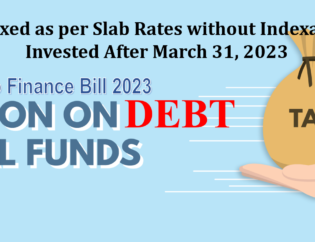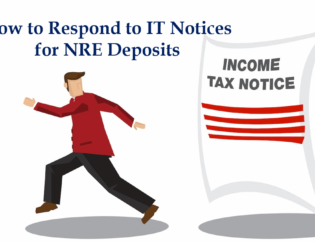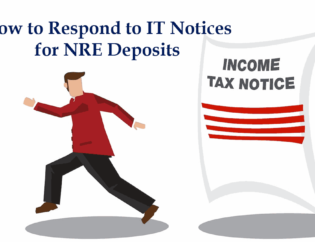On the other hand, as the rupee depreciates, RBI coming up various measures to attract foreign exchange that benefit NRIs and yield widens, there has been a lot of interest of NRI communities to invest in such investments. I have also received number of emails from NRIs asking about the taxability of these deposits. My friends working at various levels with different banks also have asked me to recommend NRIs to invest in one of these various schemes, viz. Ruppe Max by HDFC, Rupee Advantage Plan by Kotak, Rupee Plus Plan by ICICI, FCNB Premium Account by SBI, Premium Rupee Plan by Yes, Rupee Multiplier by IndusInd, etc. However, I believe that it may NOT be a good investment for MOST of the NRIs.
The chief reason for not recommending to NRIs is the taxability. In my first blog “Should NRI invest in FCNR deposits with Forward Cover”, while evaluating the investment, I briefly explained taxation as one of the issues. Banks have been marketing and have also mentioned on their website that the maturity proceeds are tax free. I have talked to relationship managers of a lot of banks and have asked for the specific provision of the Income Tax Act which allows them not to deduct TDS or which says such income is exempt. Unfortunately, I have not received any tax laws or any substantive reply from any bank, till date.
In this blog, I would go in detail of the provisions of Income Tax Act and my interpretation of the applicable laws.
Preamble:
Before we analyze the various provisions, it is important to note that the return on FCNR deposits with forward cover has two components – interest on FCNR deposit and return on forward contract. If you are of the opinion that it is not a return on forward contract but is a part of the FCNR interest or preferential conversion rate, your views can be different. I am not sure why would you think that with a signed forward contract, but if you do, your views about taxation could be different. Also, please note the views are personal and are shared for general benefit so that investors can make an informed decision and are not to be construed as an offer or advice. Please contact your financial or tax advisor or relationship manager before investing.
Taxation of interest on NRE Deposit Account:
Section 10 of the Income Tax Act lists the income not included in calculation of total income i.e. income exempt from Income Tax in India. As per Section 10 (4)
“(ii) in the case of an individual, any income by way of interest on moneys standing to his credit in a Non-Resident (External) Account in any bank in India in accordance with the Foreign Exchange Management Act, 1999 (42 of 1999), and the rules made thereunder…”
My view: Interest on NRE account is not included in total income and is exempt from Income Tax in India as per Section 10(4) (ii).
Taxation of interest on Foreign Currency (FCNR Deposit): As per Section 10 (15)
“(iv) interest payable—
…..
(fa) by a scheduled bank to a non-resident or to a person who is not ordinarily resident within the meaning of sub-section (6) of section 6 on deposits in foreign currency where the acceptance of such deposits by the bank is approved by the Reserve Bank of India.”
My view: Interest on FCNR account is not included in total income and is exempt from Income Tax in India as per Section 10(15)(iv)(fa).
Taxation of Benefit due to Forward Cover:
On maturity, you would find out whether you made any gain or loss. So if you booked a forward contract to exchange money at Rs. 80/$, you would have made a gain or loss depending on whether the exchange rate is Rs. 70/$ or 85/$ respectively. If currency rate is Rs. 85/$, you would be better off not entering into forward contract. In an unlikely situation that conversion rate is Rs. 80/$, there is no gain but what is the point of entering into the forward contract? If forex rate is Rs. 70/$, the difference (gain) would be taxable in India as there is no exemption available for gain on forward contract to NRIs.
Section 195 relates to the TDS on payment (“Other Sums”) to NRIs. As per Section 195 (1), any person responsible for paying to a non-resident, any other sum chargeable under the provisions of this Act shall deduct income-tax thereon at the rates in force.
My view: The gain on forward contract is subject to income tax in India. Also, Banks are responsible u/s. 195 to deduct the tax on the gain.
My Communications with Banks:
Bank personnel have told me that FCNR and NRE accounts are exempt account. Also, money stays in FCNR deposits and then converted into NRE account and as both accounts are exempt and freely convertible account, there is no liability of income tax. They also mentioned that there will not be any TDS. I think even NRI clients are also told that bank will not deduct any TDS.
On sharing my logic about the taxation of such investment and that this could be mis-selling, the reply I got was mainly in the line of “Client (NRI) is responsible for his/her taxes. We do not provide any tax advice and we ask client to check with their tax advisors”. But my point is, when you compare the return or yield to the NRE FD interest or indicate online the maturity is tax free, you indirectly communicate to your client that it is completely tax free in India.
I sincerely doubt if banks are deliberately doing this as there could be severe consequences both regulatory (Income Tax) as well as business (loss of client’s trust) in long term. On the other hand, I am not sure if banks do not know the taxation (having big CA firms as consultants) and are ignoring this as I have not received any written communication about taxation of such investments from any bank till date. If one or two banks are doing it, it can be argued that it is an issue but all the banks are doing it. Furthermore, NRI relationship managers of any bank would tell me that it’s not his/her bank only but other banks are also doing it. And as, all are saying the same thing, taxation is not an issue.
Summary
As we are client-centric and have our clients’ best interest at heart, we mainly do not recommend investing in FCNR deposits with forward cover, due to the 5 reasons I mentioned in my earlier blog especially for NRIs from tax heaven countries such as UAE or Singapore. Taxation may not be an issue for NRIs from certain countries e.g. USA where NRE interest is also taxable. For you, I leave it to your fine judgment. Please be careful before you enter into an agreement.
I appreciate any feedback or comment regarding this post and your experiences or communications with your banks or advisors. If you found something new or relevant, please share so that I can update the blog for the educational benefit of the NRIs.









Can you please specify the income tax section under which the forward cover gain be taxable?
The most important point is whether it is an income or not (gift). If income, whether taxable or exempt. If it is not exempt, it is taxable. As per Section 56 (1) of the Income Tax Act “Income of every kind which is not to be excluded from the total income under this Act shall be chargeable to income-tax under the head “Income from other sources”, if it is not chargeable to income-tax under any of the heads specified in section 14, items A to E.”
Mr. Patel,
Read both your articles, very well written and very useful. Thank you.
I am considering significant investment into a Forward Linked FCNR deposit. I am offered an yield of about 15% I suppose due to the Forward premium. I note from your articles that taxation remains a grey area. Do you see any other risks?
I’d much appreciate your clarification on the applicability of the Forward Contract itself. As in your example, at 80+ per $ I am sure the bank wouldn’t have an issue honoring the Forward, but what if INR appreciates rapidly to <40 per $, will the bank still honor the Forward? Or is the Forward valid only as long as the INR remains above a preset threshold, say 50 per $?
Cheers.
I do not see any other risk for now. However, please consult your financial or tax advisor before making investments. You would have to check the contract whether there is any preset threshold. Usually there is none, but your written contract would be final. Please do not trust any words or promises of customer reps but read the contract.
Hi,
I just went on HDFC web site to check info the bank provides on Rupeemax.
According to their website, listed below, they don’t claim to provide tax exemption on the entire amount for RupeeMax.
It seems banks have taken note to Jigar Patel comment and made some correction.
http://www.hdfcbank.com/nri_banking/accounts/fcnr_deposits/foreign_currency_deposits.htm
However, I would like to hear Jigar’s view on the request from Sandeep Patel in the email chain above.
Thanks and keep up the great work.
Dinesh
Thank you and I really appreciate your kind words. But I can not take credit of what I didn’t do. HDFC already had “-” marked on taxation and I have mentioned it in my blog as well. The taxation comes into picture only when there is a gain i.e. spot exchange rate at maturity is lower than the forward rate and I think banks have not taken that into consideration. Thanks for your overwhelming comment.
Hi Jigar,
See below answers to my questions from HDFC bank. Your thoughts? Thx.
Dennis
USA
Dear Sir,
1. How bank will define sell rate and forward buy rate? What is the formula to be used? – Sir, there is no formula to calculate the forward rate. It is the interest rate differential between two currencies and this is available at the inter bank levels.
2. Interest on FCNR account is not included in individual total income and is exempt from Income Tax in India as per Section 10(15)(iv)(fa). However, the gain on forward contract is subject to income tax in India. Also, Banks are responsible u/s. 195 to deduct the tax on the gain. Is that true? Do I get earnings documents for tax purpose every year from the bank? – Sir, As far as taxation is concerned there are no tax implications for you here in India, however on repatriation to your country depending upon the global taxation laws, the money you repatriate shall attract taxes for which you should consult your CA, who can give you accurate details. However, in India we shall not be deducting any taxes while your repatriate your maturity amount. Also there is deposit slip which you shall receive with the maturity details being mentioned on the same with maturity dates and amounts.
In comparisons, I don’t see tax cost to arrive at net earnings. Please do revert and advise. – Sir, when you make any investments from your NRE Account , there are no tax implications whatsoever that are deducted in India, only on repatriation depending upon the country you wire the money as per global taxation laws it shall attract taxes.
Thanks and good day.
1. Ok.
2. I have a different opinion as mentioned in the blog.
3. Effect of tax on net income – you have to judge yourself. I think it matters.
Thanks.
Hi,
I just filed for an FCNR deposit with Kotak bank with 12.5% interest rate for a tenure of 5 years. Being a US resident I am now worried how much will my earnings (principal and interest) will be subject to taxation since I will be filing joint taxes with my partner in the state of NY.
Please advice.
The interest on FCNR deposit will be taxable and you would have to show the same in your 1040. You may have to file Form 8938 and FBAR if the investment amount is above the reporting threshold. Please contact your CPA for taxation of forward contract. Thanks.
Hi Jigar, Very informative. could you please clarify: Are the forward rates 1.5-2%+ above NRE FD taxable or all of it?
While I think it can be claimed as exempt, it would be debatable and may not be easy if there is an inquiry. Thanks.
Could you comment on the following banks response ?
I have read the blog which you have sent me.The interpretation of FCNR forward cover is wrong by this CA because of following reasons.
1. Normally forward cover is taken to hedge your position to save potential currency loss. The forward cover in India is taken by major exporters in India. There is no case of Income so no tax arises.
2. This blog mentioned about when you transfer funds from different currencies but all the banks are doing FCNR forward from funds which are already there in NRE account.
3. We have many clients who have done the forwards with us and their deposits have matured as well and we have not deducted any tax.
Plus sending you this email and confirming that there is no TDS on income arise on maturity of FCNR forward.
If the interest rate difference if more than 1%+, you may do it. Please note that the yield difference is a gimmick. The interest rate on NRE deposits are compounded quarterly. While the yield may be 11%, if the same is converted into quarterly compounded interest rate, it could be just 9.25%. You need to compare this rate with NRE FD rate and only if it is more than 1.5-2%+, I would recommend. The taxation of interest is debatable and of the bank says it is not taxable and no TDS deducted, you may take that risk. Thanks.
Suppose the banks give written commitment that they will not take TDS then are we safe ? Funds are from UAE where there is no tax.
Yes, provided you get about 1.5-2+% more than NRE. Thanks.
Dear Mr. Jigar,
Thanks for your earlier inputs. One more clarification :
Kotak Bank in their web site for High Yield Currency Plan state :
1) Invest through your foreign currency funds or NRE deposit
2) Minimum NRE deposit amount is Rs. equivalent of USD 25,000/- or equivalent in any of the nine currencies for which we have a Nostro account
3) Interest earned are exempted form Income tax in India
4) Fully and freely repatriable deposit (both principal and Interest)
Just wanted to know if the bank has a NOSTRA account does it change the situation regarding possible taxation ?
Thanks
I invested with Indusind bank where they did a FCNR in JPY but their documentation is weak and the transaction appears shady. All they sent me was a FCNR receipt in JPY with 3.26% annualized return. They made me sign a contract where counter currency in INR on maturity was mentioned giving a gross return of 11% but they took the original contract back leaving me with only FCNR receipt in JPY with 3.26% of annualized return. There is no reference of 11% return or lien on NRE FD anywhere including my internet login on their website. There was no formal communication from the bank specifying that I have bought a ”Rupee Multiplier” product from them or anything of that sort. Has anyone here gone through a similar experience with Indusind Bank or if you have bought the same product from some other bank what documentation have you received?
I would suggest you to contact the concerned IndusInd bank personnel. He/She would be able to help you with the documentation if anything is missing. If you can’t find the answer or have any question, let me know the person you contacted with his/her contact details and I can connect you to my contact at IndusInd bank in Gujarat. Thanks.
Sapna, I too have FCNR Forward contract in JPY with Indusind and they did provide me the contract on stamp paper with maturity amount in INR along with the FCNR receipt.
Hi Jigar,
Will there be any tax liability if person was NRE while booking the FCNR Forward contract but becomes ordinary resident before maturity i.e. he returned to India for good?
Thanks for your very informative blog!
Regards
Pravin Patel
On becoming resident, you may continue the FCNR FD until maturity. The interest would be exempt from tax only if your residential status is NRI or Nor Ordinary Resident. Thanks.
Thanks for the useful article. However, you missed out on one point. The Gain / Loss on Forward Contract will be taxable under what Income Head? Capital Gain or Other Income? I think it should be Capital Gain. If it is Capital Gain – will it be considered short term or long term? Since FCNR forward are for minimum of one year it should be long term. Isn’t it? Further what provisions of Capital Gain will be applicable? Will it qualify for indexation?
Would appreciate further clarification.
Thanks
Whether taxable or not itself is debatable. So I did not go in which head. Trying to avoid any controversies. Please contact your CA. Thanks.
Hello Jigar:
Your article is extremely informative. I need a clarification. I made a few FCNR deposits with forward cover. My Residential Status is RNOR till Assessment Year 2016-17. Therefore from assessment year (2017-18) I need to pay income tax on the accrued interest. This part is clear to me. But what is not clear is how will be the tax treatment on the gain (if any) due to the forward cover. Will it be treated as a long term capital gain on the difference between spot and contracted rate on maturity? Will the compounded amount be the basis or just the principal as I would have already paid due taxes on the accrued interest. Or is there another way to compute the taxation on this?
Your detailed clarification will be appreciated.
You would only know if it is a gain or loss only on expiry. Also, there is no clear solution as the taxation is debatable. I suggest you follow your CA’s advice. Thanks.
Recently I have returned to India at the end of Oct 2015 after working ion different countries for more than 25 years. I have NFE FDs and FCNR forward contract with Indian bank. Some of the NRE FDs will mature in 2018 and 2019 and also FCNR forward contract will expire at the end of 2020.
My queries ARE:
1) Do I classify myself as RNOR for 2016 – 17?
2) Is there any fixed time frame for the conversion from RNOR to Resident Indian since I have stayed in overseas for more than 25 years.
3) Will my NRE FDs interest will be taxed on maturity once I become Resident Indian?
4) Will my FCNR forward contract accrued interest is liable for long term capital gains tax at the time of maturity, as I will be a Resident India after 2017 – 18?
5) Can you explain more about RNOR and how does it differ from Resident Indian for tax liabilities?
6) Is there any clear cut tax laws applicable for NRE and RNOR for NFR FDs and FCNR forward contracts?
1. Yes
2. You are already a “Resident”. Only for Income tax purpose your status is “Resident but Not Ordinary Resident”. Once your stay in India is 729 days in preceding 7 years, you would become an “Ordinary Resident”. I think you would be considered an Ordinary Resident from 2018-19.
3. Your NRE interest has become taxable on becoming Resident under FEMA i.e. on the date of your return i.e. from end of October 2015.
4. FCNR FD interest in not taxable until your status is NRI or RNOR. Once your status is changed to Ordinary Resident, it will become taxable.
5. RNOR is only for income tax purpose and foreign income won’t be taxable for RNOR. Indian govt. gives 2-3 years for returning NRIs to settle and move their assets to India and get used to Income tax laws.
6. Interest on NRE and FCNR accounts in not taxable for NRIs. On returning to India, FCNR FDs can be continued until maturity and interest won’t be taxable for RNOR. On return, NRE accounts need to be closed and balance can be transferred to resident account or RFC – Resident Foreign Currency account. Interest on RFC would be exempt from tax for RNOR. Interest on NRE and resident account would be taxable for returnees. Thanks.
If I am U.S. citizen and live for more than 180 days in India and have no income in
India, am I required to file Income Tax return in India showing U.S. income?
Tel. No. 516 484 5084
Only if you are an “Ordinary Resident”, your global income would be taxable. Thanks.
Dear Sri Patel, I must say your writing is excellent on the subject with focus on clarity. Normally one comes across explanations couched in ambivalent , misleading language. You hit it squarely on the nail’s head. Now my experience with HDFC is similar to one Ms. Sapna with Indusind bank. Unsatisfactory documentation and I felt I was hustled into it by target oriented staff whose knowledge was found wanting. HDFC does have some reputation but still the papers I got from them do not satisfy me. I felt I had been naïve to their soliciting even though it appears I may gain by the contract. Some CAs tell me that there may not be any tax as the money in the game is earned overseas after payment of IT in that country . The Banksters ( I use the Daily Mail – A British Tabloid term) are evasive on tax . Keep up your good work
Very well written article Jigar. Just a thought, Explanation 2 to clause (15)(iv) of section 10 states that “For the purposes of this clause, the expression “interest” includes hedging transaction charges on account of currency fluctuation”… Will this cover the forex gain.
Also even in case there is no forward contract, non-resident is bound to have forex gain/ loss. Is that also taxable in India ?
1. It is a debatable issue.
2. If no forward contract, the money would be in foreign currency as the FD is in foreign currency and no forex gain/loss. On maturity, if the investor chooses, he may convert the same at prevailing exchange rate so no forex gain/loss. Thanks.
I want to under stand if a NRI goes for forward cover contract after the funds have arrived in FCNR in USD, On maturity date he gets back his dollors with no exchange loss. He will get his normal USD interest rates plus forward cover contract fees or earnings which is HOWMUCH ? CAN YOU PLEASE INFORM ME ON MY EMAIL ID GIVEN ABOVE
I think on maturity, INR will be credited and not USD. If USD is credited, there is no issue. Thanks.
Hello Mr.Patel
I am an NRI staying in UAE . I would like to know which bank is offering highest interest rates for NRI FD’s ? Also do you suggest FCNR deposits over normal NRE FD’s ?
Can you please suggest some good SIP funds that I can consider to invest now ?
Thanks
1. The bank providing highest interest keep on changing. Also, it should not be the only criteria.
2. FCNR is best if you do not want to take currency risk (rupee depreciation). NRE FD is best if you want to keep money in FD. FCNR with forward cover is not recommended. Thanks.
Hi Jigar,
I have gone through article related FCNR with forward contract and it is quite informative and give clear idea.
I am thinking for the same instrument for investment but my problem is by next financial year I am returning to India and my status will be ordinary resident so I am confused whether it is good decision to do investment in this instrument or not considering the tax situation if applicable.
Please guide.
Thanks and best regards,
Jignesh
If you become an Ordinary resident, the interest on FCNR FDs would be taxable for you. So I would recommend not to complicate the matter but to invest as if you are going to be a resident soon. Thanks.
Dear sir, very informative articles. My small queries as below –
1. RNOR has two conditions – •If you have been an NRI in 9 out of 10 financial years preceding the year OR •You have during the 7 financial years preceding the year been in India for a period of 729 days or less – either of these two conditions is to be fulfilled, is that correct understanding?
2. In your article you have mentioned that According to FEMA the day you are returning to India ( repatriating NRIs ), the income / interests from that day will become taxable – say a person repatriates on 1st March then will the interests on NRE Deposits become taxable from 1st March or being NRE status for financial year the interests taxability will start from subsequent financial year i.e. 1st April ?
3. Does FCR deposits with forward cover contracts details of interest portion & the exchange rate cover portion? How does these incomes are treated for RNOR status?
Thanks
1. If either is satisfied, your status would be Ordinary Resident.
2. Technically, 1st March. However, for practical purpose as there is only 1 month and it is a reasonable time for you to inform bank of your change in status, you may consider interest from April 1 as taxable interest.
3. They don’t say explicitly but it can be determined. FCNR interest is not taxable for RNOR and gain exchange rate is a grey are but can also be considered not taxable as not possible for bank or income tax to calculate the return. Thanks.
I was told by Branch Manager of YES Bank that amount invested through YES Premium Rupee Plan (PRP) are Guaranteed as the Contract will be made on Stamp Paper. In this case even if the bank dissolves, the amount at Maturity will be provided as mentioned on Stamp Paper. Is it True ??
It depends on the guarantor. If guarantor is solvent, not an issue but if the guarantor is bankrupt, there could be trouble. RBI does not give guarantee on any plan or schemes of any bank. Thanks.